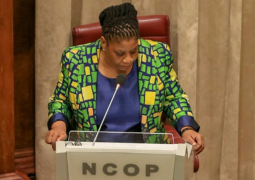
Presenting Budget Vote Two of Parliament of 2018/19 financial year, the Chairperson of the National Council of Provinces (NCOP), Ms Thandi Modise, stated that at the beginning of this 5th Parliament, we said our overarching mission was to “provide the people of South Africa with a vibrant people`s Assembly that intervenes and transforms society and addresses the challenges of our people".
We also reviewed and affirmed our vision of building an activist people’s Parliament that is responsive to the needs of our people, driven by the ideal of realising a better quality of life for all South Africans, she continued.
Affirming the NCOP mandate, she quoted former President Nelson Mandela’s address to the NCOP in 1998, where he said: “The NCOP is uniquely placed to reflect the diversity of our society and to synthesise the experience of those spheres of government which are charged with the great bulk of the task of implementing our national programme of fundamental change”.
As the NCOP, we play an important role in strengthening cooperative governance. Even though we have improved our consideration of the interventions in municipalities, we are, I think – not there yet, she said. “We still need to pass legislation, which I learn is stuck somewhere in the queue to Cabinet. This legislation must help us be quick and decisive in the ‘Yes’ or ‘No’ of interventions.”
She commended the improvement of the quality of debates in the NCOP and an increased focus by its Members on their key mandate: matters affecting their provinces.
She said in pursuit of outcomes-based oversight, they have adopted a new model for Taking Parliament to the People programme (TPTTP), which has recently assumed an integrative approach.
Delineating the budget allocations for the 2018/19 financial year, she stated that Parliament requested an amount of R2.8 billion from the Treasury, but its request was not met. “For the 2018/19 financial year Parliament’s actual allocation is R2.4 billion). As a consequence, we have a shortfall of R476 million, which has a direct bearing on how we run this institution.”
In the last financial year, the committees have remained the epicentres of our strategic force in holding the executive accountable, said Mr Jomo Nyambi.
“The recent Taking to Parliament to the People programme has seen the merger of the NCOP and NA (National Assembly) committees working together to hold the executive to account.”
The continued joint collaboration of the NCOP and NA in joint Budget Office and Adhoc Committees has reignited committees as engines of Parliament, he said. “This collaboration will form part of our legacy report as the fifth Parliament. This will ensure that we change the status quo and transform our society.”
We have to be always mindful that our sole existence is to serve as a mouthpiece of the people, he said. “This must not be seen to be done during elections, but should be an epitome that actualises our existence.”
As Parliament we are charged with the task of conducting oversight over the executive to ensure that resources follow their functions and tasks. But ironically, Parliament Strategic Programme One has been allocated well more than R28 million, but there are no stipulated performance indicators, said Mr Farhat Essack.
“Also, we have been constantly informed by the Auditor-General that departments don’t submit quarterly reports as required, how can we, as this House, be seen to be having an effective role in holding the executive to account?” he asked.
“The NCOP sat quietly and did nothing when the public money was looted to build Nkandla,” said Ms Brenda Mathevula. “This House also did nothing when state-owned entities were looted by the Guptas. This House has done nothing to departments that were charged by the Auditor-General for wasteful expenditure. This House instead approved their budgets without holding them to account. We therefore, reject this budget,” she added.
The persistent decrease of parliamentary budget is worrying, said Mr Lennox Gaehler. “Budget remains a key instrument of Parliament in advancing our democracy and creating a better life for all. Its reduction threatens these resolves and we must never allow it to diminish the gains of our democracy.”
The NCOP must ensure that it is the eyes, ears and mouthpieces of the 57 million South Africans, said Mr Mntomuhle Khawula. “This House has, instead, been the eyes, mouthpieces and ears of state capture. This happened even when the Public Protector made recommendations to turn this tide, worst of all Parliament was found stuttering,” he said.
South Africans cast their eyes on this debate with expectations to see whether it will push back the frontiers of poverty and inequality. The new dawn has allowed us to win back the trust of the people, said Mr Seiso Mohai. And by example, we need to lead, he said. “If we live up to the aspirations of our “Activists Parliament” we can achieve greater results that can have a positive impact on our people.”
To resolve the persistent decrease of parliamentary budget, we first have to be seen not as the less effective arm of the state but a critical player in this regard, said Ms Modise. “As Presiding Officers, we have resolved to engage not the Minister of Finance, but the Head of State as equals. This seeks to ensure that Parliament takes its rightful place as one of the three arms of the state,” she said.
By Abel Mputing
22 May 2018

